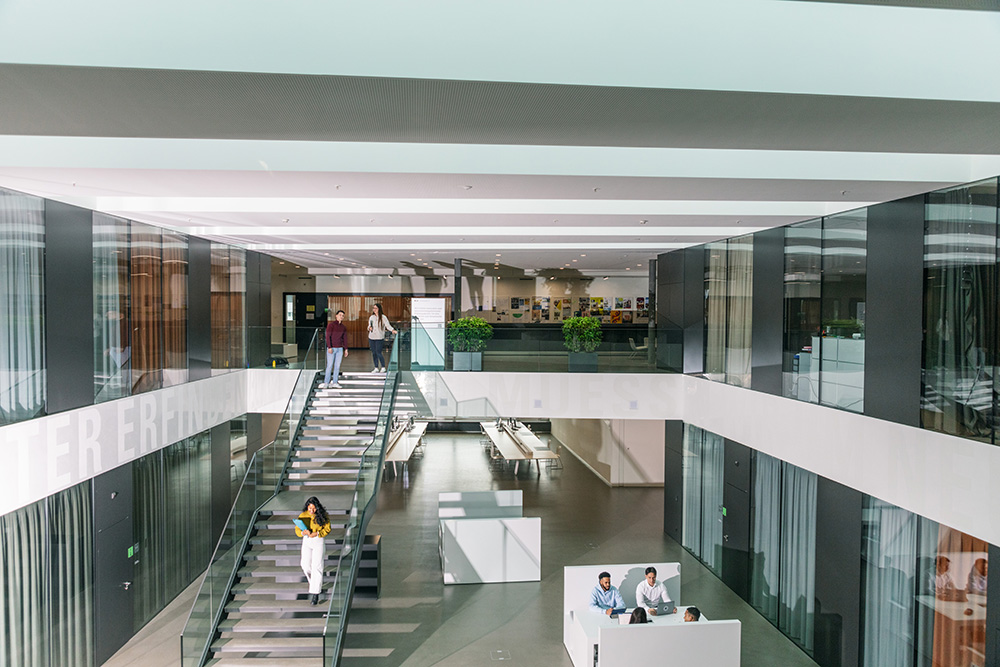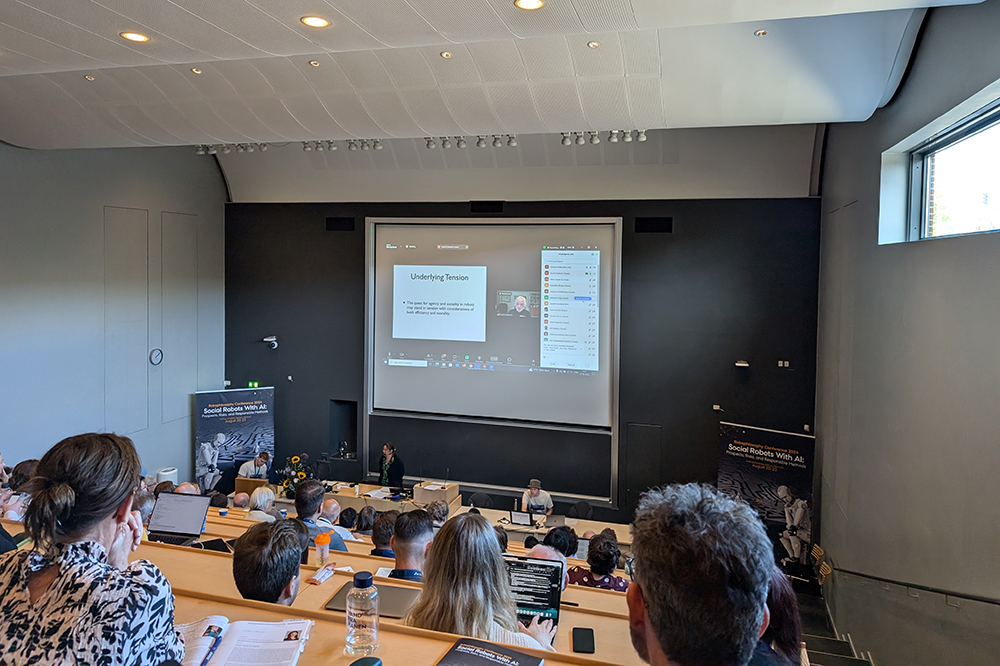Prof. Dr. Oliver Bendel has been teaching information ethics, AI ethics, robot ethics, and machine ethics at the FHNW for around 15 years. He is responsible for the “Ethik und Technologiefolgenabschätzung” (“Ethics and Technology Assessment”) module in the new Business AI degree program at the FHNW School of Business in Olten. Here, the focus is on AI ethics, but students will also learn about robot ethics and machine ethics approaches – including annotated decision trees and moral prompt engineering. And they will use information ethics, including data ethics, to analyze and evaluate the origins and flows of data and information and engage in bias discussions. Last but not least, they will delve into technology assessment. Oliver Bendel also teaches the “Ethik und Recht” (“Ethics and Law”) module in the Business Information Systems degree program at the FHNW School of Business in Olten (which he took over in 2010 as “Informatik, Ethik und Gesellschaft”, later renamed “Informationsethik”), the “Recht und Ethik” (“Law and Ethics”) module in the Geomatics degree program at the FHNW School of Architecture, Construction and Geomatics in Muttenz, and “Ethisches Reflektieren” (“Ethical Reflecting”) and “Ethisches Implementieren” (“Ethical Implementing”) in the Data Science degree program at the FHNW School of Engineering in Brugg-Windisch. His elective modules on social robotics are very popular (Photo: Pati Grabowicz).
Keynote by David Chalmers
On the second day of Robophilosophy 2024, David Chalmers, an Australian philosopher and cognitive scientist, gave a keynote speech entitled “Does Generative AI Extend the Mind?”. From the website: “Prof. Chalmers is known worldwide, also outside of philosophy, for his contributions to consciousness research in ‘The Character of Consciousness’ (2010), and in particular for identifying more clearly than anyone the tasks for a philosophical account of consciousness (‘the hard problem’ of consciousness). Since recent advances in AI bring Chalmers’ thought experiment of ‘philosophical zombies’ closer to reality, in his current research he combines philosophy and a longstanding interest in AI for the exploration of the status of virtual reality … and the likelihood of creating artificial systems that fulfil the criteria of consciousness.” (Website Robophilosophy 2024) A key statement was: “As social AI systems become increasingly agent-like, they will decreasingly extend the mind …” The final statement was: “The quest for agency and sociality in robotsmay stand in tension with considerations of both efficiency and morality.” The audience applauded the witty and humorous talk.
Ick bin een Berlina
On January 29, 2024, the article “‘Ick bin een Berlina’: dialect proficiency impacts a robot’s trustworthiness and competence evaluation” was published in Frontiers in Robotics and AI. Authors are Katharina Kühne, Erika Herbold, Oliver Bendel, Yuefang Zhou, and Martin H. Fischer. With the exception of Oliver Bendel – who is a professor at the School of FHNW and an associated researcher in the PECoG group – all of them are members of the University of Potsdam. The paper says about the background: “Robots are increasingly used as interaction partners with humans. Social robots are designed to follow expected behavioral norms when engaging with humans and are available with different voices and even accents. Some studies suggest that people prefer robots to speak in the user’s dialect, while others indicate a preference for different dialects.” The following results are mentioned: “We found a positive relationship between participants’ self-reported Berlin dialect proficiency and trustworthiness in the dialect-speaking robot. Only when controlled for demographic factors, there was a positive association between participants’ dialect proficiency, dialect performance and their assessment of robot’s competence for the standard German-speaking robot. Participants’ age, gender, length of residency in Berlin, and device used to respond also influenced assessments. Finally, the robot’s competence positively predicted its trustworthiness.” The article can be accessed at www.frontiersin.org/articles/10.3389/frobt.2023.1241519/full.
AAAI Spring Symposia Return to Stanford
In late August 2023, AAAI announced the continuation of the AAAI Spring Symposium Series, to be held at Stanford University from 25-27 March 2024. Due to staff shortages, the prestigious conference had to be held at the Hyatt Regency SFO Airport in San Francisco in 2023 – and will now return to its traditional venue. The call for proposals is available on the AAAI Spring Symposium Series page. Proposals are due by 6 October 2023. They should be submitted to the symposium co-chairs, Christopher Geib (SIFT, USA) and Ron Petrick (Heriot-Watt University, UK), via the online submission page. Over the past ten years, the AAAI Spring Symposia have been relevant not only to classical AI, but also to roboethics and machine ethics. Groundbreaking symposia were, for example, “Ethical and Moral Considerations in Non-Human Agents” in 2016, “AI for Social Good” in 2017, or “AI and Society: Ethics, Safety and Trustworthiness in Intelligent Agents” in 2018. More information is available at aaai.org/conference/spring-symposia/sss24/.
ICSR 2023 in Qatar
Next to Robophilosophy, ICSR may be the most important conference on social robotics. The fourteenth edition took place in Florence at the end of 2022 and was dedicated to the health sector. “The 15th International Conference on Social Robotics (ICSR 2023) will bring together researchers and practitioners working on the interaction between humans and intelligent robots and on the integration of social robots into our society. ICSR 2023 will take place in Doha as a face-to-face conference on December 4-7, 2023. This will be the first time that the conference will be hosted in Qatar and in the Middle East and North Africa region.” (Website ICSR) The theme of this year’s ICSR is “Human-Robot Collaboration: Sea, Air, Land, Space and Cyberspace”. According to the organizers, the theme emphasizes on all physical and cyber-physical domains where humans and robots collaborate. Whether Doha is suitable as a venue for the conference needs to be discussed. Qatar is ruled as an absolute monarchy. Sharia law is considered a main source of legislation. The human rights situation in the country has been critical for decades. More information and CfP via icrs.iovision.tn.
AAAI Spring Symposia Proceedings 1992-2018
The AAAI Spring Symposia is a legendary conference that has been held since 1992. It usually takes place at Stanford University. Until 2018, the leading US artificial intelligence organization itself published the proceedings. Since 2019, each symposium is responsible for its own. Following a restructuring of the AAAI website, the proceedings can be found in a section of the new “AAAI Conference and Symposium Proceedings” page. In 2016, Stanford University hosted one of the most important gatherings on machine ethics and robot ethics ever, the symposium “Ethical and Moral Considerations in Non-Human Agents” … Contributors included Peter M. Asaro, Oliver Bendel, Joanna J. Bryson, Lily Frank, The Anh Han, and Luis Moniz Pereira. Also present was Ronald C. Arkin, one of the most important and – because of his military research – controversial machine ethicists. The 2017 and 2018 symposia were also groundbreaking for machine ethics and attracted experts from around the world. The papers can be accessed at aaai.org/aaai-publications/aaai-conference-proceedings.
LaborDigital Conference at the ZHdK
The LaborDigital conference at the Zurich University of the Arts (ZHdK) will take place on February 10, 2023 in English and German. It was initiated and organized by Charlotte Axelsson and others. The conference will open with a lecture by Prof. Dr. Johan Frederik Hartle, Rector of the Academy of Fine Arts Vienna. This will be followed by the keynote “Labor-Geschichte/s. On the Archaeology of a ‘Creative’ Space” by Prof. Dr. Oliver Ruf from the Bonn-Rhein-Sieg University of Applied Sciences. From 11:00 to 12:30, three Experimental Learning Labs will take place in parallel, namely “Artifacts of Machine Ethics” with Prof. Dr. Oliver Bendel (FHNW, Muttenz, Olten and Brugg-Windisch), “Dance Lab & Avatar” with Regina Bäck (Munich), and “Experimental Game Cultures Labs” with Prof. Dr. Margarete Jahrmann (University of Applied Arts Vienna). Lunch will be followed by ZHdK Lab Visits and more Experimental Learning Labs starting at 3:30 pm. At 4:30 p.m., Raphaële Bidault-Waddington, founder of the LIID Future Lab in Paris, will deliver the second keynote, titled “Designing Art-based Future Labs.” Johan Frederik Hartle will conclude the conference with further remarks. For more information, visit paul.zhdk.ch/course/view.php?id=2312.
Proceedings of Robophilosophy 2022
In January 2023, the proceedings of Robophilosophy 2022 were published, under the title “Social Robots in Social Institutions”. “This book presents the Proceedings of Robophilosophy 2022, the 5th event in the biennial Robophilosophy conference series, held in Helsinki, Finland, from 16 to 19 August 2022. The theme of this edition of the conference was Social Robots in Social Institutions, and it featured international multidisciplinary research from the humanities, social sciences, Human-Robot Interaction, and social robotics. The 63 papers, 41 workshop papers and 5 posters included in this book are divided into 4 sections: plenaries, sessions, workshops and posters, with the 41 papers in the ‘Sessions’ section grouped into 13 subdivisions including elderly care, healthcare, law, education and art, as well as ethics and religion. These papers explore the anticipated conceptual and practical changes which will come about in the course of introducing social robotics into public and private institutions, such as public services, legal systems, social and healthcare services, or educational institutions.” (Website IOS Press) The proceedings contain the paper “Robots in Policing” by Oliver Bendel and the poster “Tamagotchi on our couch: Are social robots perceived as pets?” by Katharina Kühne, Melinda A. Jeglinski-Mende, and Oliver Bendel. More information via www.iospress.com/catalog/books/social-robots-in-social-institutions.
AAAI 2023 Spring Symposia in San Fran
The Association for the Advancement of Artificial Intelligence (AAAI) is pleased to present the AAAI 2023 Spring Symposia, to be held at the Hyatt Regency, San Francisco Airport, California, March 27-29. According to the organizers, Stanford University cannot act as host this time because of insufficient staff. Symposia of particular interest from a philosophical point of view are “AI Climate Tipping-Point Discovery”, “AI Trustworthiness Assessment”, “Computational Approaches to Scientific Discovery”, “Evaluation and Design of Generalist Systems (EDGeS): Challenges and methods for assessing the new generation of AI”, and “Socially Responsible AI for Well-being”. According to AAAI, symposia generally range from 40–75 participants each. “Participation will be open to active participants as well as other interested individuals on a first-come, first-served basis.” (Website AAAI) Over the past decade, the conference has become one of the most important venues in the world for discussions on robot ethics, machine ethics, and AI ethics. It will be held again at History Corner from 2024. Further information via www.aaai.org/Symposia/Spring/sss23.php.
A CARE-MOMO for Lio
The discipline of machine ethics examines, designs, and produces moral machines. The artificial morality (aka machine morality) is usually pre-programmed by a producer or developer. However, another approach is the more flexible morality menu (MOME), an invention by Prof. Dr. Oliver Bendel. With this, owners or users replicate their own moral preferences and convictions onto a machine. A team at the School of Business FHNW implemented a MOME for MOBO (a certain chatbot) in 2019/2020. This project was continued in 2022. Marc Heimann developed a morality menu under the supervision of Oliver Bendel, which is part of a morality module (MOMO) for a care robot like Lio from F&P Robotics. The principle is the same as for the MOBO-MOME. With sliders, the patient can determine the behavior of the robot. This supports his or her personal autonomy and ensures his or her well-being. The results of the CARE-MOMO project will be presented to the company F&P Robotics, which accompanied the project, in October 2022.









